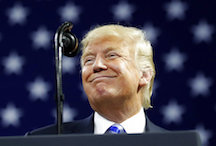President Donald Trump reiterated his threat to impose tariffs on cars imported from the European Union if the U.S. can’t reach a trade deal with the EU, ratcheting up pressure amid already strained relations between the traditional allies.

Trump’s latest threat came just days after the Commerce Department sent him the findings of a probe into the national-security risks of auto imports. The Trump administration hasn’t disclosed the conclusions in the report, but it isn’t wasting time trying to use it as leverage to extract concessions.
The U.S. and EU have been clinging to a fragile trade truce since July, when Trump and EU Commission President Jean-Claude Juncker agreed to launch new trade talks. At the time, Trump promised not to impose new tariffs while the talks were ongoing.
But the trans-Atlantic tension between America and Europe was on full display at a security conference in Munich this weekend, where European diplomats gave Vice President Mike Pence a frosty welcome. German Chancellor Angela Merkel rejected the notion that European cars are a threat to U.S. national security, noting that many European models are built in America.
90-Day Review
Commerce Secretary Wilbur Ross submitted his recommendations from the security probe to Trump on Sunday, without publicly offering any insights into the findings. Trump has 90 days to decide whether to act.
Commerce started the investigation in May under Section 232 of the Trade Expansion Act, the same provision the administration used last year to slap tariffs on steel and aluminum. The car probe covers imports of vehicles including SUVs, vans and light trucks, as well as auto parts.
Trump has threatened levies of as much as 25 percent on foreign-made vehicles. Companies and governments from Europe to Asia have warned Trump that such tariffs would hurt the U.S. economy and disrupt the global auto industry.
On Monday the EU said that it will stick to its word not to impose new tariffs, as long as the U.S. does the same. The 28-nation bloc is readying retaliatory tariffs totaling 20 billion euros ($22.7 billion) of U.S. goods should Trump follow through on his threat to impose duties on EU cars and auto parts.
Negotiations for a trade agreement have not officially started and the two sides are still at odds over the scope any deal would take. While the U.S. insists agriculture should be part of the discussions—and many key U.S. lawmakers have pressed the Trump administration to hold a firm line on the issue—EU officials consider the topic off limits.







